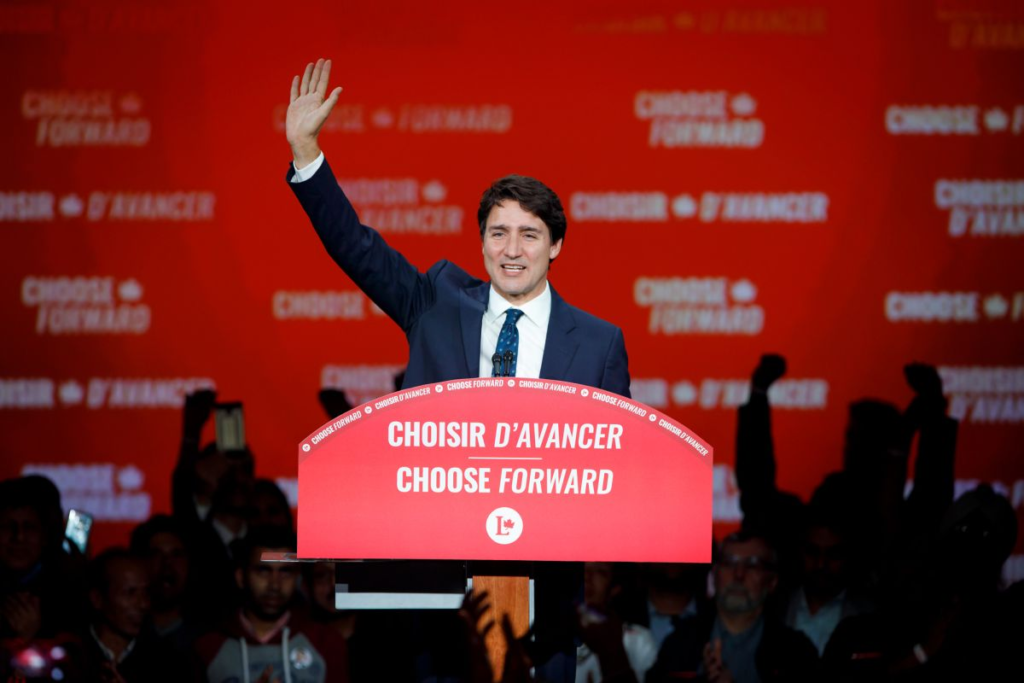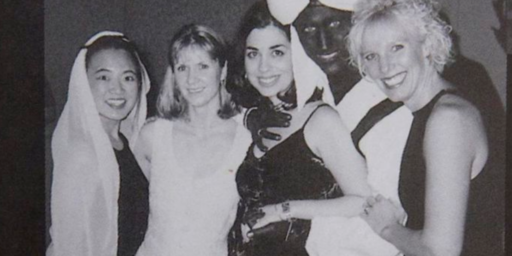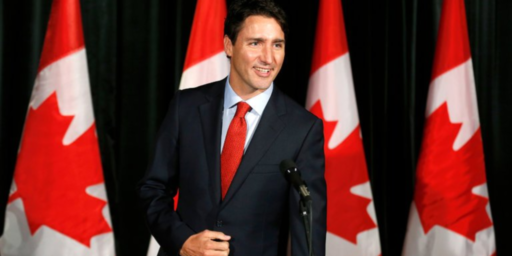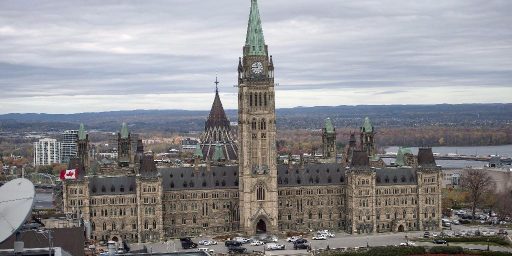Trudeau Holds On To Power In Minority Government
Justin Trudeau lost his majority but will still hold on to power in Canada, the question is how long it will last.

Justin Trudeau and his Liberal Party ended up pulling off a victory last night, though falling short of the majority they held in the wake of the 2015 General Election:
Prime Minister Justin Trudeau of Canada was headed to a second term on Monday after an often ugly campaign that became a referendum on his character and on his authenticity as an earnest standard-bearer for liberalism.
Mr. Trudeau’s Liberal Party will not retain its majority in Canada’s House of Commons, according to projections by the Canadian Broadcasting Corporation, but it will keep enough seats to allow Mr. Trudeau to form a government, with support from two left-leaning parties.
The victory was a personal vindication for Mr. Trudeau, who battled accusations that he had bullied his former attorney general, an Indigenous woman, and faced damaging revelations late in the race that he had dressed in blackface and brownface as a young man.
But these problems also clearly took a toll. The Liberals’ share of the popular vote fell throughout the country as it was losing its hold over the House of Commons.
His victory in 2015 was a surprise. His win on Monday, no matter how qualified, had been by no means assured. A charismatic figure, Mr. Trudeau came to power in 2015, touting himself as a new kind of politician — a self-proclaimed feminist committed to fighting climate change, open to refugees and dedicated to transparent, collaborative decision-making, what he called “sunny ways.”
Mr. Trudeau must not only mend public opinion about his character but work with political rivals to advance his agenda.
“Trudeau comes out of this likely relieved but chastened,” said Shachi Kurl, the executive director of the Angus Reid Institute, a nonprofit polling group. “If the last two years weren’t easy, it’s only going to get harder. Those sunny ways are just so past now.”
(…)
Mr. Trudeau will not form a formal coalition with any of the three smaller parties in Canada. Instead he will rely on their support on a vote-by-vote basis.
The Bloc Québécois, a party that promotes Quebec’s independence and that appeared near extinction at the beginning of the year, emerged with the third highest number of seats in the new House of Commons, the least expected outcome of the vote.
Jagmeet Singh of the New Democratic Party, or N.D.P., the first nonwhite to lead a major Canadian party, struggled before the campaign and during its early days. While he caught the eye of many voters, the party ultimately collapsed in Quebec, its stronghold since 2011, and will be a smaller force in Parliament going forward.
And the Green Party also failed to make a major breakthrough, with incomplete results indicating that it will gain one more seat, taking its total to three.
The People’s Party of Canada, a new far-right movement, found no electoral success. Even its founder, the former Conservative foreign minister Maxime Bernier, lost his re-election bid.
Early Tuesday morning before all the ballots had been counted, the Liberals held 156 seats, 14 short of majority. The Conservatives, led by Mr. Scheer, won 122 seats. As was the case in polls throughout the campaign, the two parties were roughly tied in the popular vote, with the Conservatives slightly ahead.
More from The Globe And Mail:
Justin Trudeau’s Liberals have retained enough seats to govern with a strong minority in the House of Commons as the result of a robust showing in Ontario, bringing an end to an acrimonious campaign and ushering in the uncertainty of a divided Parliament and a country split along regional lines.
The Liberals face significant challenges as they enter their second mandate: They won the most seats in the House, but appeared to lose the popular vote to the Conservatives. They were shut out in Alberta and Saskatchewan.
The minority situation will force the Liberal Prime Minister, who swept to power in 2015 as a champion of progressive values but became tainted by ethical scandals and broken promises, to negotiate political alliances with the NDP or the Bloc Québécois to maintain power. Mr. Trudeau will face a resurgent Bloc, which was elected in 32 of Quebec’s 78 seats late Monday, and the Conservatives holding a tight grip in the Prairies, where anger mounted at the Liberals for failing to get the Trans Mountain pipeline expansion built in their first four years in government and introducing new legislation that changed the rules for environmental reviews.
The leaders broke with tradition after the results came in, with none of them waiting for the previous one to finish speaking before taking the stage.
While Conservative Leader Andrew Scheer waited for NDP Leader Jagmeet Singh to finish a substantial part of his speech, Mr. Trudeau began in Montreal within minutes of Mr. Scheer taking to the podium in Regina.
The Liberal Leader framed his minority election as a “clear mandate,” despite Conservatives winning the popular vote.
“From coast to coast to coast, tonight Canadians rejected fear and negativity. They rejected cuts and austerity and they voted in favour of a progressive agenda and strong action on climate change.”
The minority win diminishes Mr. Trudeau’s authority, but is more of a setback for Mr. Scheer. It’s rare for an incumbent government to be ousted after one mandate, but the Tories set expectations high for their rookie leader. Ultimately, he was unable to capitalize on Liberal troubles in the face of relentless attacks as a leader out of sync on the environment and social issues.
One of the biggest upsets of the night was veteran Liberal cabinet minister Ralph Goodale losing his Regina-Wascana riding.
Deputy Conservative Leader Lisa Raitt was unseated in the Ontario riding of Milton, and People’s Party Leader Maxime Bernier lost his Quebec seat.Other than Mr. Bernier, all of the party leaders won their ridings.
Mr. Scheer acknowledged it was not the result he had hoped for but he nonetheless claimed victory for reducing the Liberals to a minority while winning the popular vote.
“What we do know is that after the 2015 election, when Justin Trudeau looked unstoppable, all the pundits and experts said it was the beginning of another Trudeau dynasty,” Mr. Scheer said while standing alongside his family at his party’s election-night event at Evraz Place in Regina.
“Tonight, Conservatives have put Justin Trudeau on notice. And Mr. Trudeau, when your government falls, Conservatives will be ready and we will win.
The latest projection from the Canadian Broadcast Corporation shows the following with respect to each parties representation in Parliament:
- Liberal Party — 157 seats and 33.1% of the total nationwide vote;
- Conservative Party —- 122 seats and 34.1% of the total nationwide vote;
- Bloc Québécois — 32 seats and 7.7%;
- New Democrat Party — 24 seats and 15.9% of the total nationwide vote;
- Green Party — 3 seats and 6,5% of the total nationwide vote;
- All other parties (including one independent member of Parliament) garnered roughly 2% of the total nationwide vote
To win a majority, the Liberals would have needed 170 seats to win a majority so this outcome puts them thirteen seats short of a majority government but close enough to a majority to seemingly be able to govern effectively on a vote-by-vote basis. Admittedly, this is going to be a far more difficult way to govern than the majority government that the Liberals had from 2015 to now had been. It will require, to the largest degree, on relying upon the weakened but still strong New Democrats and possibly Bloc Québécois for support and may require Liberals to scale back some of their more ambitious plans. At least in theory, though, it is something that should be manageable as long as the Liberals themselves remain united and Trudeau doesn’t stumble in a manner that calls his leadership into question. Whether that will mean that the government will make it to the end of its mandated four-year term in 2023 is unclear, though, and its generally true that minority governments in Parliamentary systems tend to be more fragile. So, we may see elections sooner rather than later in Canada, but for now, Justin Trudeau will maintain his hold on power.
As I noted yesterday, from the coverage the campaign north of the border received coverage here in the United States it did not seem as though there was one single issue or set of issues that compelled voters to go to the polls. To the extent the campaign was marred by scandal, it came from the early revelation that Trudeau had donned blackface — or as they apparently call it in Canada “brownface — as part of talent shows when he was a college student. The Prime Minister immediately apologized for the incident, and to a large degree, it isn’t clear that it had much of a significant impact on the race itself. Instead, Trudeau and his party have been more weighed down by a scandal that became evident earlier in the year regarding interventions that Trudeau and several of his top deputies made on behalf of a Canadian company facing Federal investigation. On the other side of the aisle, the Conservative Party leader Andrew Scheer did not seem to compare well to his counterpart. Thus, to the extent the election came down to the question of who Canadians wanted to spend the next four years with, the choice seemed rather obvious.




One thing I find intriguing is how dominant Toronto is in the Canada’s election process. It provides over 1/6 (58) of the 339 seats in parliament. It also provided about 1/3 of the Liberal seats.
When you realize that Canada is a big country in terms of area (2nd biggest in the world) with a small population (37.5 million) it becomes easier to understand.
For example, 90% of the population of Canada lives within 100 miles of the US border.
As Vox put it, Canada is a huge country. Most of it is unfit for human habitation.
PHENOMENAL GEOGRAPHIC POWER…iiitty bitty living space.
Ok. I officially declare parliamentary democracies to be utterly weird.
I get a majority of seats, and I get coalition governments. that’s simple enough. but how is executive rule with a minority of seats, and a rather small plurality of the vote, fair or representative?
@Kathy: Yeah, was just saying the same thing to my wife. If I understand correctly, the Liberals have 46% of the seats and 33% of the popular vote, yet they’ll almost certainly just continue in power since the incumbent gets first crack at forming a government and the smaller parties are unlikely to vote no confidence immediately after the election. Not sure that’s really a more representative system than the American one!
@Doug Mataconis:
Climate change will fix that. I wonder if we can charge them for the service?
@Kathy:
It isn’t. I find it rather puzzling that 1% fewer votes can result in better than 25% more parliamentary seats.
Liberal Party — 157 seats and 33.1% of the total nationwide vote;
Conservative Party —- 122 seats and 34.1% of the total nationwide vote;
ETA my back of the hand math is off by about 5%. More like 30% more seats
@Kathy:
He rules by getting support from one or more of the smaller parties. Principally, I suspect that Trudeau will be able to get large chunks of the Liberal Party agenda passed with the help of legislators from the New Democrat Party, which is actually to the left of the Liberals. He may also be able to get the support of some members of Bloc Quebecois
In effect, it is a de facto coalition style of governance. Whether it will be stable enough to keep the Liberals in power for another four years without having to call new elections is another question.
@Doug Mataconis:
Because what matters is the number of seats — or as they are called in Canada “ridings” — a party wins not the percentage of the nationwide vote they received.
@R.Dave:
The other factor is that the Liberals are the only party that has a realistic chance of putting together a coalition of 170 seats. With only 122 seats, the Conservatives are too far away and have no viable partners among the other parties.
@OzarkHillbilly:
Well, not so fast.
In this (very possible) worst case scenario, Europe would get hit worse, but North America would be pretty royally f-ed too. The last time the gulf stream was interrupted, at the beginning of the Younger Dryas period about 12,00 years ago, North America was nearly immediately glaciated (like, in 2 or 3 decades). To be fair, that glaciation was also possibly due to water and ice ejecta in our atmosphere blocking out sunlight, but I’d rather not find out if the Greenland ice sheet melt alone can plunge the northern hemisphere into an ice age.
@Neil Hudelson: Yeah I’ve read that. Small changes at the beginnings of models can end with large differences in results. The blocking of the Gulf Stream ends with disaster every time.
Good to know that Halifax remains a viable alternative should Trump manage to steal the election, again.
@Doug Mataconis: I’d love to read a primer on the Canadian electoral system, if you have a recommendation, or the ability to write one. I haven’t tried googling for one yet, but I probably will tonight.
I would be careful about calling another country’s electoral system “weird” until you try explaining our primary system to normal people, most of whom live outside the country. “Well, hell, no wonder you elected Trump with something that stupid!” is a standard in-law response.
@David S.:
It’s really not complicated. Country is divided into “ridings” (translation: districts). It’s roughly done based on population but imperfectly.
Voters elect a representative to the House in each riding (Member of Parliament). Simple majority wins in each riding.
Party with a majority of MPs = government and the leader of the party is the Prime Minister, who chooses a cabinet, usually out of the MPs in his party (but not limited to them). So PM is not a nationally elected position. The PM is simply the person who won a leadership vote at his or her party convention.
If there’s no majority, the incumbent PM gets a chance to form a government with the confidence of the entire House (so on a major vote he needs majority support – ie. from other parties). If that’s impossible, typically the party with the most seats can try. If it is not possible – new election.